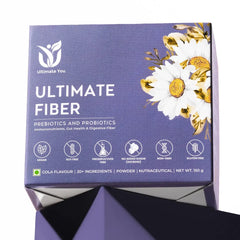From Chai to Thali, stay on track with Ultimate Fiber daily - India's #1 natural solution for gut health!
Acidity and bloating are two of the most common digestive complaints people face today. Whether it’s that uncomfortable burning in your chest after a spicy meal or the heavy, swollen feeling followed by lunch, these symptoms can make your day even worse, impacting your focus, and energy.
While antacids and quick fixes might offer temporary relief, they don’t address the root cause. One of the most natural, long-term ways to improve digestive function and prevent these discomforts is by adding more fiber to your daily diet.
Whether through whole foods or a quality supplement, having a fiber rich diet plays a key role in keeping your digestive system moving smoothly, reducing acid reflux, and relieving gas and bloating.
In this article, we’ll break down exactly how fiber works, the best sources of it, and how to adopt a fiber-rich lifestyle that supports your gut and overall well-being.
Let’s get started!
What is Acidity?
Acidity, often called heartburn or acid reflux, occurs when stomach acid flows back up into the esophagus. This can cause:
- A burning sensation in the chest or throat
- Sour burps or a bitter taste in the mouth
- Indigestion and discomfort after eating
Common triggers include spicy foods, large meals, high-fat diets, lying down soon after eating, or even stress. If persistent, it can lead to GERD (gastroesophageal reflux disease).
What is Bloating?
Bloating is the sensation of abdominal fullness, tightness, or swelling. It can be accompanied by:
- Visible distension of the stomach
- Gas, belching, or flatulence
- Cramping or abdominal pain
Bloating can be caused by poor digestion, constipation, food intolerances (like lactose or gluten), overeating, or imbalances in gut bacteria. Fiber plays a direct role in resolving many of these issues.
Why Choose Fiber for Digestive Health?
Fiber is the part of plant-based food that the body can't digest. Rather than being broken down and absorbed, it passes relatively intact through your digestive system. While this might sound like a passive function, its benefits are far-reaching.
Now let’s understand the types of fiber.
Types of Fiber
There are two main types of dietary fiber:
Soluble Fiber
Experience the benefits of a happy gut with soluble fiber. When dissolved in water, it forms a soothing gel-like substance that slows down digestion, helping to lower blood sugar and cholesterol levels. It also absorbs excess acid in the stomach, providing quick relief from acidity and heartburn. Plus, it acts as a prebiotic, feeding beneficial gut bacteria to promote a balanced gut microbiome.
Sources: Oats, apples, bananas, chia seeds, flaxseeds, psyllium husk, and legumes
Insoluble Fiber
Insoluble fiber doesn't dissolve in water, instead, it adds bulk to your stool, promoting regular bowel movements and preventing constipation. By speeding up the passage of food and waste, it helps maintain a healthy digestive system, keeping you feeling light and comfortable throughout the day.
Sources: Whole grains, vegetables, nuts and seeds
How Fiber Helps With Acidity?
Absorbs Excess Stomach Acid
Soluble fiber acts like a sponge, soaking up and neutralizing some of the acid produced during digestion. This helps reduce the burning sensation caused by acid reflux.
Slows Down Digestion
By slowing gastric emptying, soluble fiber prevents overeating and reduces the chance of stomach contents being pushed back into the esophagus.
Forms a Protective Layer
Some fibers, like oats and flax seeds, coat the stomach lining and create a protective gel-like barrier that shields it from acid irritation.
Reduces Inflammation in the Gut
A fiber-rich diet promotes a healthy microbiome, which in turn can reduce inflammation, a known contributor to acid reflux symptoms.
How Fiber Reduces Bloating?
Improves Gut Motility
Insoluble fiber helps push food through your digestive tract more efficiently, reducing the time food spends fermenting and causing gas.
Prevents Constipation
A major cause of bloating is constipation. By bulking up and softening stool, fiber promotes regular bowel movements and prevents gas buildup.
Feeds Good Gut Bacteria
Soluble fiber acts as a prebiotic, feeding beneficial gut bacteria. A healthier microbiome helps reduce gas production and bloating.
Balances Fluid Retention
Fiber helps regulate sodium and water balance in the body, reducing puffiness and the bloated feeling that can come with water retention.
Step-by-Step Guide to Increasing Fiber Intake
If you’re used to a low-fiber diet, suddenly increasing your intake can actually cause gas and bloating. Instead, follow this gentle approach:
Start Low and Go Slow
Start with small portions of high-fiber foods, gradually increase over 1–2 weeks, and observe your body's response to avoid discomfort and support smooth digestion.
Add Fiber to Every Meal
-
Breakfast: Start the day with a bowl of oatmeal topped with bananas, chia seeds, or berries.
-
Lunch: Include whole grain breads, brown rice, or a hearty vegetable salad with legumes.
-
Dinner: Swap white rice for quinoa or millet. Add a side of steamed or stir-fried vegetables.
- Snacks: Reach for apples, roasted chickpeas, popcorn, or nuts instead of processed snacks.
Hydrate Well
A high-fiber diet needs plenty of water to work effectively. Without enough water, you may experience constipation. Aim for 2 to 2.5 liters (8-10 glasses) of water daily. Drinking herbal teas or warm water in the morning can also help stimulate digestion and boost gut motility.
Best Fiber-Rich Foods to Beat Acidity and Bloating
Let’s look at some Soluble Fiber for Acidity superstars you can easily include in your daily diet.
|
Food |
Benefits |
|
Oats |
Soothes stomach lining, reduces acid. |
|
Bananas |
Low-acid, contains pectin, helps digestion. |
|
Apples (with skin) |
High in pectin and antioxidants. |
|
Flaxseeds |
Gel-forming, protects gut lining. |
|
Avocados |
Creamy, rich in soluble fiber and healthy fats. |
|
Barley |
Calms digestion, great alternative to rice. |
Insoluble Fiber for Bloating
|
Food |
Benefits |
|
Whole Wheat Bread |
Adds bulk, speeds up transit time. |
|
Brown Rice |
Gentle on the stomach, supports regularity. |
|
Carrots, Cucumbers, Leafy Greens |
Rich in cellulose, reduce gas. |
|
Broccoli & Cabbage |
High in insoluble fiber and sulfur compounds that support detoxification (steam to reduce gas). |
|
Lentils and Beans |
Excellent fiber source—soak before cooking to reduce gas. |
|
Berries (with seeds) |
Rich in both types of fiber and antioxidants. |
Making a Fiber-Rich Lifestyle Sustainable
Incorporating fiber shouldn’t feel like a chore. Here’s how to make it effortless and delicious.
Read Food Labels
When selecting products, look for "whole grain" as the first ingredient and opt for options with at least 3-5g of fiber per serving. Prioritize whole foods over "fiber-enriched" ultra-processed snacks for better nutritional benefits.
Easy Healthy Swaps
|
Instead of |
Try This |
|
White rice |
Brown rice, quinoa, or barley |
|
White bread |
Whole wheat or sprouted grain bread |
|
Sugary snacks |
Apples, roasted peanuts, or trail mix |
|
Packaged cereal |
Oats or bran flakes with fruit |
Fiber-Boosting Tips
- Add flaxseed or chia to smoothies or curd.
- Use vegetables as noodles (zucchini or carrot spirals).
- Stir beans into soups, curries, or salads.
- Keep roasted gram or chana as a snack at work.
Customize to Your Body
If you're sensitive to legumes or cruciferous vegetables, try starting with softer options like zucchini, squash, or cooked spinach. To support a diverse microbiome, rotate different types of fiber in your diet. If you're often on-the-go, travel frequently, or struggle to get enough fiber from food, consider a daily fiber supplement like Ultimate Fiber daily.
Why Choose Ultimate Fiber Daily?
BUY NOW
If you want to simplify your routine, Ultimate Fiber Daily is a convenient, effective way to ensure you're meeting your fiber needs without bloating, artificial additives, or digestive upset.
- Blend of prebiotics and probiotics
- Comes in cola flavor
- Gentle on digestion, ideal for daily use
- Supports gut health, reduces inflammation, and controls sugar levels
This supplement can complement a fiber-rich diet or act as a foundational tool for those transitioning into one.
Final Thoughts
Out and out, acidity and bloating may be common, but they don't have to be your norm. By increasing your intake of dietary fiber through whole foods or a smart supplement like Ultimate Fiber, you can experience:
- Fewer episodes of heartburn and acid reflux
- Less bloating, gas, and abdominal discomfort
- Improved gut health and regularity
- A lighter, more energized feeling throughout the day
Start small, be consistent, and listen to your body. With fiber as your ally, you can enjoy meals again without the fear of digestive distress and feel more in control of your health from the inside out.
Do you have any concerns about acidity and bloating? Are you eager to know how fiber works for your digestive health? You can drop comments. Our team of professionals will clarify them as soon as possible.
Disclaimer
The information provided is for educational purposes only and is not intended to be a substitute for medical treatment. If you're pregnant, nursing, taking medication, or have a medical condition, it's better to consult a healthcare professional. Ultimate You does not provide any guarantee regarding the accuracy, adequacy, completeness, legality, reliability, or usefulness of the information and disclaims any liability arising from it.

Ram Charan
Content Lead
With over 7 years of experience, he crafts engaging stories and compelling narratives. He believes crisp and engaging content adds value to customers and drives immense sales to businesses. When he's not working, you'll find him hanging out with friends, binge-watching movies, and exploring the world of organic foods.
Tags
- Choosing a selection results in a full page refresh.
- Opens in a new window.
15%

on your next order
By submitting your email address, you agree to receive marketing emails from Ultimate You at the email address provided. We may use information collected about you on our site to suggest the products and offers. you can withdraw your consent at any time by following the unsubscribe instructions in any email we send to you. view Terms and Privacy. Contact Ultimate Customer Care at #204-8430 Saint Monica Building, near Char Miner, Hyderabad, India, 203455.








